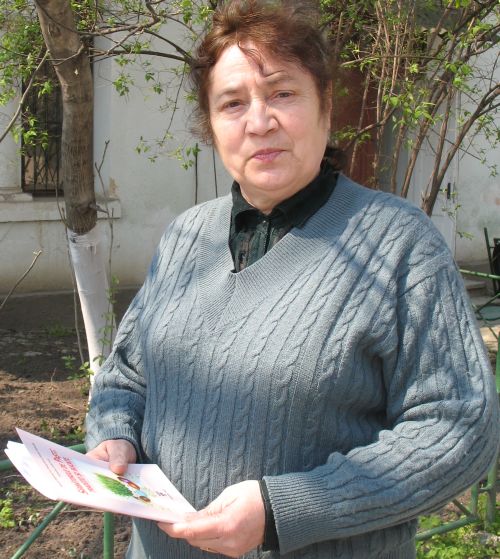
[- What is Easter’s significance in the folkloric tradition?]
- Easter is the most important holiday from the beginning of Christianity to nowadays. The Pascha (from Hebrew Pesach) means passing over, and, for the Orthodox Christians, it’s passing from death to resurrection, to eternal life. Easter is celebrated in spring, when every small flower and every blade of grass returns to life. So, these two holidays – the nature’s re-enlivenment and Our Lord’s Resurrection – are looked forward to be marked by people after a long winter and severe fasting.
[- How shall one prepare for this holiday?]
- Preparing for Easter takes a long time to get ready one’s body and soul by fasting, praying, giving alms, confessing and penitence to forgive one’s sins. The Lent lasts seven weeks and has a special significance. Very important is the last week of the Lent – the Week of the passions, every day of which has its special significance.
The masters should tidy up their courtyards and houses for Easter. The housewives cook for the Easter table during this week. On Good Thursday, they cook the Easter cakes. On Good Friday, the believers fast all the day because Jesus was crucified on this day. One should not work on this day.
On Good Saturday, the housewives prepare the Easter basket. They put Easter cakes, red eggs, lamb, fresh sheep cheese, salt and wine in there, and someone form the family takes it to the church for sanctification. On Saturday evening, young men make fires outside Moldovan villages. The superstition goes that the fires warm the field seeds and the souls of the dead.
[- What is the tradition of celebrating Easter?]
- During the Sunday night the believers should go to the church for the Resurrection mass. The priests sanctify their cakes at dawn. It’s a good thing to return from the church with your candle burning, and then you may light this candle on religious holidays.
Arriving home, the Christian should greet “Christ is risen” and the answer is “Verily He is”, and then all the members of the family wash themselves with a white egg and a red egg and with silver or golden coins, so that this brings luck to them during the whole year, so that they should be healthy and wealthy. People, and especially the children, put on new clothes. They first eat sanctified food from the church. Parts of these foodstuffs are also given to animals, while the eggshell is thrown on fields for a rich harvest.
They knock eggs in sign of joy and kinship.
They say one should eat lamb, sparrow meat to be as light as a sparrow and fish, to be as smart as a fish in the water. Instead, the superstition is that one should not eat rooster meat, since the rooster forespeaks about Jesus’ death.
[- What is the significance of Easter traditional dishes?]
- The cake symbolizes God’s body, and the wine – God’s blood. The cheese cake is surrounded by twisted dough, symbolizing man’s life, and, in the middle, the dough is twisted to form a cross, symbolizing the cross Jesus was crucified on. The hollows are filled in with cow cheese, since the say the ox warmed little Jesus with its breath in the manger.
The lamb symbolizes Jesus, God’s lamb, who sacrificed Himself for us.
The egg symbolizes the life, the universe. According to a legend, God’s mother brought a basket of eggs to the Romans torturing Jesus and laid it under the cross He was crucified on. The blood pouring from the Savior’s wounds colored the eggs. So the red color of the eggs reminds us Jesus’ blood. Initially, the reds were painted only in red, but later people started to paint them with other colors. Even later, people started to make drawings on the eggs. Traditionally, the housewives used natural dyes, but now they use chemical ones.
[- What is the entertainment specific for these holidays?]
- Easter is such an important holiday that they do not work, dance or celebrate other events on this day. The entertainment starts only the next day. The Moldovans pay visits to one another the other day.
In the past, they used to make Ferris wheels, which were used only three days on and after Easter. The ‘fee’ to climb on a Ferris wheel was a red egg. Villagers organized dances and games joined by the entire community.
[- How should one celebrate the Easter of the dead?]
- The Easter of dead is not provided by any church canon, but it’s a holy tradition linked to the cult of the dead, created by the Christians’ wisdom.
On this day they commemorate the dead relatives. It’s marked a week after Easter. During this week they tidy up graveyards, paint crosses. This holiday can be marked on other religious holidays, and the Moldovans go to cemeteries and give alms, after they are sanctified by priests, to forgive the souls of the dead. They donate textiles, clothes, tableware, red eggs, sponge cakes and candies, etc., and necessarily lit candles. Some village communities organize a joint table where they celebrate this holiday together in the memory of the dead.
The folkloric saying is that the dead live in a country far away, nobody knows where. Another superstition is that it’s good to throw the red eggshell on running waters so that it reaches that country. The eggs are full again when arriving in the country of the Dead and they celebrate Easter then.
[- You speak about so many traditions. Which of them are still kept?]
- Practically the traditions I have told you about are known and observed in all Moldova. It would be good, if we managed to keep and perpetuate the traditions of the ancestors to the future generations.

